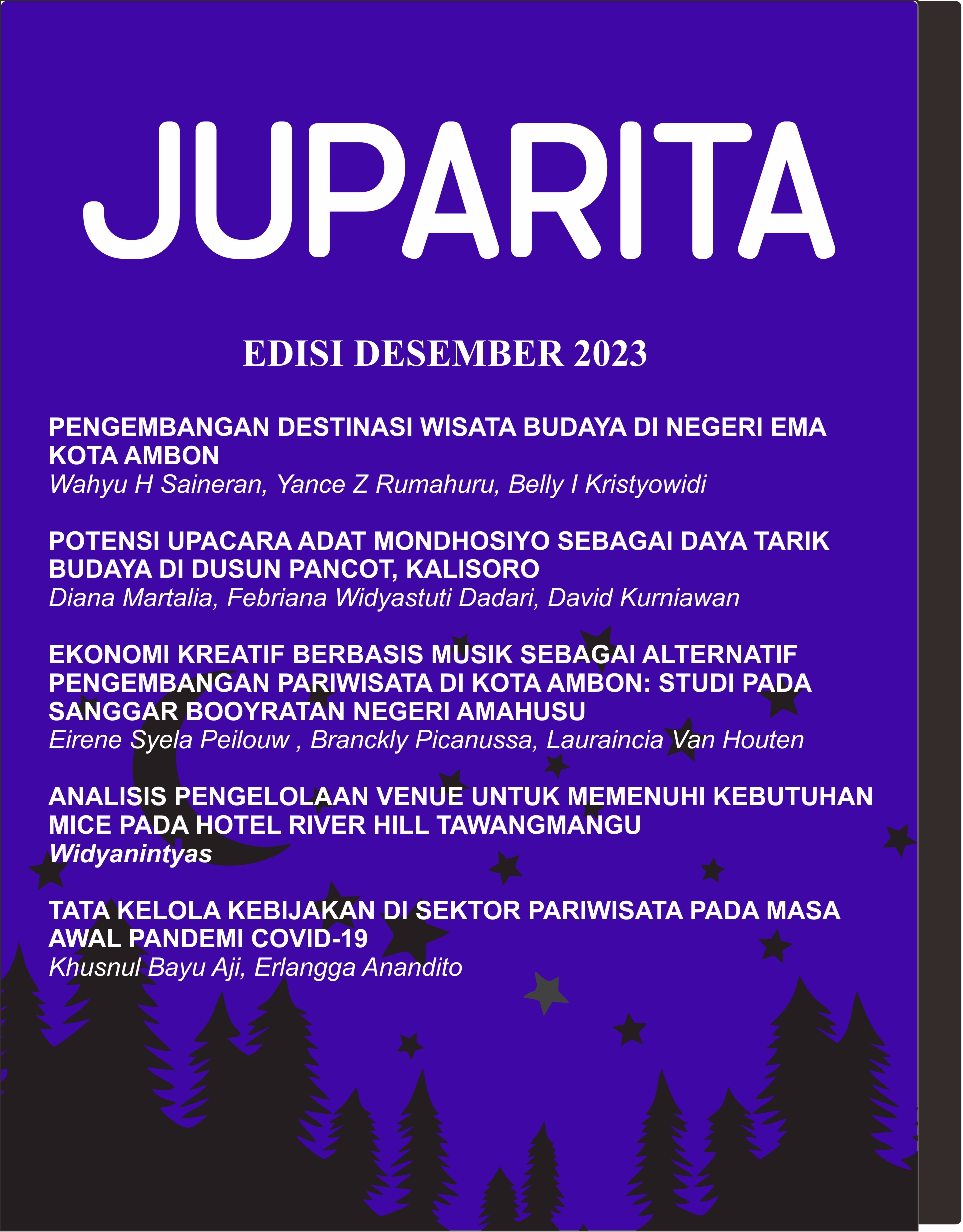TATA KELOLA KEBIJAKAN DI SEKTOR PARIWISATA PADA MASA AWAL PANDEMI COVID-19
PENGALAMAN DARI KABUPATEN GUNUNGKIDUL
DOI:
https://doi.org/10.61696/juparita.v1i2.138Keywords:
Governance, Policy, Tourism, COVID-19, GunungkidulAbstract
Similar to other territories across the globe, the tourism industry in Gunungkidul has also been negatively affected by the COVID-19 pandemic. In response to this dreadful situation, the local government immediately developed various tourism policies. Therefore, this research intends to: a) identify policies issued by the Gunungkidul local government in response to the COVID-19 outbreak crisis; b) analyze the dynamics of the implementation of these policies; and c) examine the appropriation of the policies in accordance with a strategic and holistic framework of disaster and crisis management in tourism. This was a qualitative study in which data were collected through direct observation and literature review. The data in this study were then analyzed using thematic analysis techniques. The findings indicate that local governments published at least five strategic policies during the early period of the COVID-19 pandemic. These policies typically focus on the adaptive capacity dimension, particularly in the domain of strategic implementation, and result in more emergency response measures that are also oriented toward short-term action. It means that, so far, no policy has led to the restoration and reinvestment of the tourism sector in Gunungkidul in an effort to recover from long-term conditions. On the other hand, all stakeholders should go further to initiate policies that point to preventive and mitigating measures that emerge from the current crisis as well as to anticipate similar conditions that may occur in the future.
References
Braun, V., & Clarke, V. (2013). Successful Qualitative Research: A Practical Guide for Beginners. California: SAGE Publications.
Bryman, A. (2016). Social Research Methods. Oxford: Oxford University Press.
Creswell, J.W. (2014). Research Design: Qualitative, Quantitative, and Mixed Methods Approaches (Fourth Edition). USA: SAGE Publications.
Considine, M. (1994). Public Policy: A Critical Approach. South Melbourne: Macmillan.
Daga, M.K., Kumar, N., Arthi, J., Mawari, G., Garg, S., & Rohatgi, I. (2019). From SARS-CoV to Coronavirus Disease 2019 (COVID-19) - A Brief Review. Journal of Advanced Research in Medicine, 6(4), 1-9. https://doi.org/10.24321/2349.7181.201917
Farzanegan, M.R., Gholipour, H.F., Feizi, M., Nunkoo, R., & Andargoli, A.E., (2020). International tourism and outbreak of coronavirus (COVID-19): A cross-country analysis. Journal of Travel Research. 60(3), 687-692. https://doi.org/10.1177/0047287520931593
Fong, L.H.N., Law, R., & Ye, B.H. (2020). Outlook of tourism recovery amid an epidemic: Importance of outbreak control by the government, Annals of Tourism Research. 86. https://doi.org/10.1016/j.annals.2020.102951
Gössling, S., Scott, D., & Hall, C.M. (2020). Pandemics, tourism and global change: A rapid assessment of COVID-19. Journal of Sustainable Tourism. 29(1), 1-20. https://doi.org/10.1080/09669582.2020.1758708
Henderson, J.C. (2003). Terrorism and tourism: Managing the consequences of the Bali bombings. Journal of Travel & Tourism Marketing. 15(1), 41–58. https://doi.org/10.1300/J073v15n01_03
Henderson, J.C. (2007). Tourism Crises: Causes, Consequences and Management. United Kingdom: Butterworth–Heinemann.
Hitchcock, M., & Putra, I.N.D. (2005). The Bali bombings: Tourism crisis management and conflict avoidance. Current Issues in Tourism. 8(1), 62–76. https://doi.org/10.1080/13683500508668205
Kartodirdjo, S. (1977). Metode Penggunaan Bahan Dokumen. In Koentjaraningrat (ed.), Metode-Metode Penelitian Masyarakat, 44 – 69. Jakarta: PT. Gramedia.
Kleinschmit, D., Böcher, M., & Giessen, L. (2016). Forest policy analysis: Advancing the analytical approach. Forest Policy and Economics. 68, 1–6. https://doi.org/10.1016/j.forpol.2016.05.001
Krott, M. (2005). Forest Policy Analysis. Netherlands: Springer Science and Business Media.
Hall, C.M., Scott, D., & Gössling, S. (2020). Pandemics, transformations and tourism: Be careful what you wish for. Tourism Geographies. 22(3), 577-598. https://doi.org/10.1080/14616688.2020.1759131
Jenkins, J.M., Hall, C.M., & Mkono, M. (2014). Tourism and Public Policy: Contemporary Debates and Future Directions. In Alan A. Lew, C.
Michael Hall dan Allan M. Williams (eds). The Wiley Blackwell Companion to Tourism. 542 – 555. USA: John Wiley & Sons.
Merriam, S.B., & Tisdell, E.J. (2016). Qualitative Research: A Guide to Design and Implementation (Fourth Edition). USA: Wiley and Sons.
Niewiadomski, P. (2020). COVID-19: From temporary de-globalization to discovery of tourism. Tourism Geographies. 22(3), 651-656 https://doi.org/10.1080/14616688.2020.1757749
Ntounis, N., Parker, C., Skinner, H., Steadman, C., & Warnaby, G. (2021). Tourism and hospitality industry resilience during the COVID-19 pandemic: Evidence from England. Current Issues in Tourism. 25(1), 46-59. https://doi.org/10.1080/13683500.2021.1883556
Persada, H. E., & Aji, K. B. (2021). Examining social capital-formed resilience strategy in the tourist destination during the pandemic of COVID-19: A case of Nglanggeran Tourism Village, Indonesia. ASEAN Journal on Hospitality and Tourism, 19(3), 264–278. https://doi.org/10.5614/ajht.2021.19.3.07
Ritchie, B.W. (2004). Chaos, crises and disasters: A strategic approach to crisis management in the tourism industry. Tourism Management. 25(6), 669–683. https://doi.org/10.1016/j.tourman.2003.09.004
Scarpino, M.R., & Gretzel, U. (2015). Conceptualizing Organizational Resilience in Tourism Crisis Management. In Brent W. Ritchie dan Kom Campiranon (Eds.), Tourism Crisis and Disaster Management in the Asia-Pacific, 15 – 32. United Kingdom: CABI Publishing.
Tremblay-Huet, S. (2020). COVID-19 Leads to a new context for the “right to tourism”: A reset of tourists’ perspective on space appropriation is needed. Tourism Geographies. 22(3), 720-723. https://doi.org/10.1080/14616688.2020.1759136
United Nation World Tourism Organization (UNWTO). 2020. Impact Assessment of the COVID-19 Outbreak on International Tourism. Madrid.
Veal, A.J. (2006). Research Methods for Leisure and Tourism: A Practical Guide (Third Edition). London: Pearson Education.








